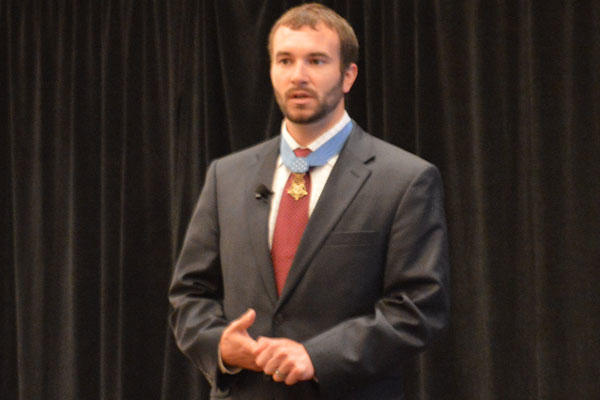Medal of Honor recipient Salvatore Giunta can still remember when he was a “sandwich artist” at Subway in 2003 thinking about joining the Army. A decade later, he has trouble believing it when soldiers tell him he was their motivation to join.
However, this is Giunta’s new life since he earned the medal for his actions during a bloody firefight in 2007 in Afghanistan’s Korengal Valley, where he rushed through a hail of bullets to drag a fellow soldier away from enemy combatants.
Giunta, a former Army staff sergeant with the 173rd Airborne Brigade Combat Team, made history in 2010 when President Obama made him the first living recipient of the Medal of Honor since the Vietnam War. Three years have passed, and three more living servicemembers have received the nation’s highest honor.
The four -- Giunta, Army Sgt. First Class Leroy Petry, former Marine Cpl. Dakota Meyer and former Army Staff Sgt. Clinton Romesha -- have formed one of the military’s most exclusive clubs and lean on each other for support. The four are joined by 76 other living recipients -- veterans from World War II, the Korean War, and the Vietnam War.
Giunta said Thursday the burden was difficult to shoulder alone at first. He felt relief in 2011 when President Obama approved Petry to become the second living Medal of Honor recipient from the wars in Iraq and Afghanistan.
“One of the best things to happen to me was Leroy. It took a lot of the pressure off because we could do it together or he could this and I could do that instead of trying to do whatever. It’s hard to not help because you want to help if you can,” he said.
Giunta explained in a speech Thursday at the Military.com Spouse Summit held near Washington, D.C., that he depends on the bonds he has formed with the fellow Medal of Honor recipients -- young and old, much like he did with his battle buddies in Afghanistan.
He struggled with the responsibility when he first received the medal as he tried to answer the question: “Why me?”
Giunta said the older generation of medal recipients helped him come to grips with the responsibility and “were really instrumental in allowing me to feel OK with it.”
He said he has made it a point to pass along the same support to Petry, Meyer and Romesha. Giunta explained that receiving the medal recently brings different challenges than the veterans of the Vietnam War faced.
“There was no whirlwind celebration for them. Now, almost instantly, Clint is rushed out to do the circuit and to do this and to do that,” Giunta said.
All four discuss their future plans and what causes they might support. Giunta said he enjoys working with high school and college-age students and speaking at Junior Reserve Officer Training Corps or ROTC detachments at universities.
Meyer has focused more on finding jobs for veterans transitioning out of the military. Petry remains in the Army so “he’s doing everything,” Giunta said. And Romesha is still figuring out what path he will take since receiving the medal at the White House in February, Giunta explained.
Out of the Army, Giunta said he has started to watch the news and he hasn’t liked what he’s seen in Afghanistan. Stationed in Italy with the 173rd, he and his wife didn’t own a television. Now living in Colorado with his wife and son, Giunta has watched from afar the progression of the war in Afghanistan.
Giunta served two deployments to Afghanistan, and he saw firsthand the sacrifice that U.S. servicemembers have made to improve the country and make it safe. He said it’s time Afghan President Hamid Karzai stepped up his leadership as the U.S. prepares to transition its forces out of Afghanistan by 2014.
“I’m not that impressed with Karzai,” Giunta said. “I think after almost 13 years of being in Afghanistan, it could be different and it’s not due to lack of blood, sweat, tears, money and youth of Americans in hopes of trying to change it.”
“I think the change has to come from within, and I think there’s a certain point where we have got to say we can’t try any harder and you have to step up to the plate. And they have failed to step up to the plate on so many occasions,” he said.
Giunta has watched most of the soldiers he served with get out of the Army. He still keeps in touch with quite a few and makes sure to meet up with them when he can to “go golfing and shoot guns.”
It’s evident that Giunta still wrestles with the responsibility of the medal and makes sure to point out that the soldiers from his unit would have done the same thing for him. But it appears that Giunta has grown more comfortable with the honor.
The support of his fellow soldiers from the 173rd has helped. But he said the ability to lean on the three other living recipients from the wars in Iraq and Afghanistan has gone a long way.
“When I have a question, I can’t ask it to everyone. But I can ask [Petry, Meyer, and Romesha],” Giunta said.



























